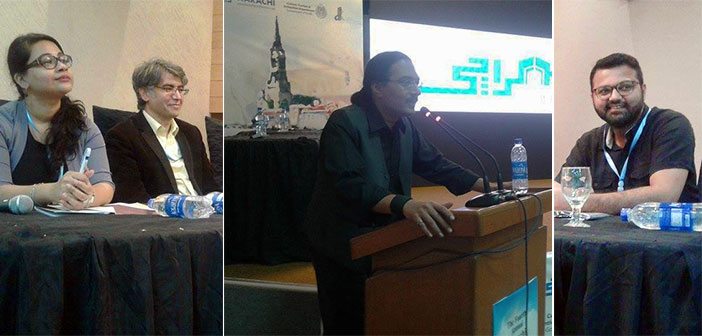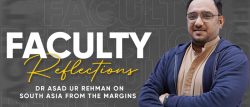Exploring various facets of Karachi’s historical, socio-political, economic and cultural life, the Karachi Conference is being organized by the Karachi Conference Foundation every year in order to celebrate the socioeconomic depth and cultural mosaic of one of the most ethnically and religiously diverse cities in the world.
Featuring several film screenings and interesting research on the ‘City of Lights’ by local and international academic institutions, scholars, development workers, social activists, policy-makers, and artists, the three-day event was held from Dec 09 – Dec 11, 2016 at the National Museum Auditorium with the support of the Department of Culture, Tourism & Antiquities, Government of Sindh.
Reverend members from Habib University’s (HU) faculty including Dr. Hasan Ali Khan, Dr. Hafeez Jamali and Dr. Noman Baig also participated in the conference and presented their research work revolving around some vivid memories and recollections of the diversified communities such as the Catholics, the Makrani Baloch, and long-established traditions being practiced over the years.
The first in the enlightening itinerary was an ethnographic film Shahbaz Qalandar, made by Dr. Hasan Ali Khan, Assistant Professor at HU’s School of Arts, Humanities and Social Sciences (AHSS), and independent film makers including Shabbir Siraj and Nofil Naqvi. Exploring the religious/spiritual life of the city of Sehwan Sharif in Pakistan, the film closely examined the centrality of Qalandariyya.
I made this film to highlight the reality of customs and traditions being followed in the city of Sehwan and from where it derives its religious essence, something which is usually not being depicted in the rest of the films being made on the given subject.
– Dr. Hasan Ali Khan
Moving on, with the topic of faith and belief, Donna Fernandes, Programme Coordinator for Social Development & Policy (SDP) at HU, presented her research paper titled, “Diasporic Memory and Sacred Journey: Our Lady of Good Health Velankanni and Karachi.” The paper discussed about the representation of the Mother, which is being based on her apparitions and how the self-proclaimed depiction over the years still remains unquestioned by devotees in South Asia. The paper further explored that the devotees assert of “answered prayers,” “miracles,” and “needs” while observing devotion to Our Lady of Velankanni in the modern metropolis of Karachi.
This topic is important to me because of my interest in community social work, which involves understanding social relations between various structures and communities. It is also important to me because I often feel that when the Christian community is represented in Karachi, we are often fed with images about Christmas and Easter. What is rarely ever talked about is the birth of the Mother and that being Virgin Mary.
– Donna Fernandes
Bringing a shift into the course of the event, Dr. Hafeez Jamali, Assistant Professor and Director of the Interdisciplinary Development Research and Action Center (IDRAC) at HU, presented his research work highlighting the essential role being played by the Makrani Baloch community in building modern Karachi.
The paper titled, “Shorelines of Memory and Ports of Desire: Shifting Geographies and the Memory of Oceanic Trade in the Makran Coast and Karachi,” traced the movement of Baloch and African-descent bodies through trade and migration between Zanzibar, Muscat, Gwadar, and Karachi in order to show the emergent colonial geography being created by various infrastructure projects.
Apart from the informative sessions presented by the HU faculty at the 4th Annual Karachi Conference, a short film called “The Untouchable”, made by HU student Ali Rizvi, was also screened.
Highlighting the significance of Karachi and the diverse aspects of its urban existence, the 4th Annual Karachi Conference turned out to be a delightfully stimulating experience for the participants and the attendees alike. The three-day conference not only took one on a ride through the history of the diverse communities in Karachi but it also addressed some key questions essential for the future of the modern metropolis.




